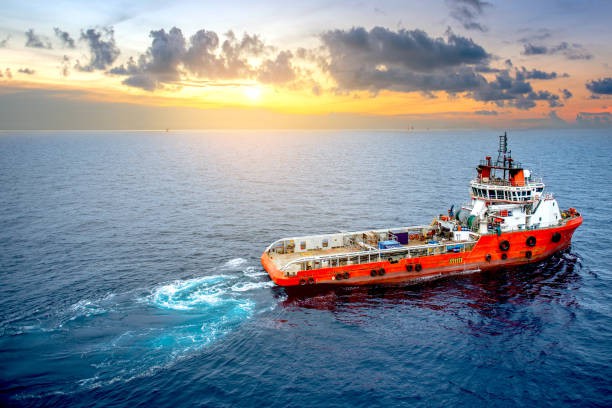
Platform Supply Vessels, or PSVs, are a critical component of the offshore oil and gas industry. These specialized ships are used to transport essential supplies, equipment, and personnel to offshore platforms, rigs, and drilling sites. In this article, we'll explore the role of PSVs in the industry, their design and capabilities, and the key players in the market.
The Role of PSVs in Offshore Operations
Offshore operations are complex and demanding, with crews working in remote and often harsh environments. PSVs are essential to keep these operations running smoothly, providing the necessary equipment and supplies to keep the platforms and rigs operational.
PSVs are used to transport a wide range of materials, including drilling fluids, cement, mud, chemicals, and water. They also transport equipment such as drill pipes, casings, and other components needed for drilling operations. Additionally, they transport essential supplies, including food, water, fuel, and medical supplies, to offshore personnel.
PSVs are also used to transport personnel to and from the offshore sites. These vessels typically have accommodation facilities, allowing the crew to rest and recharge between shifts. They are also equipped with medical facilities to provide care in case of emergencies.
Design and Capabilities of PSVs
PSVs are designed to operate in harsh offshore conditions, with the ability to navigate through rough seas and high winds. They have a large open deck space that can accommodate various types of cargo and equipment. The cargo area is typically covered, protecting the cargo from the elements.
PSVs are equipped with powerful engines that provide the necessary thrust to operate in the open sea. They also have advanced navigation and positioning systems to ensure accurate and safe operations.
PSVs are classified based on their size and capabilities. They can range in length from 50 to over 100 meters and have different cargo capacities. Some PSVs are designed to transport specialized equipment, such as seismic survey equipment or diving gear, while others are designed for general-purpose use.
The Key Players in the PSV Market
The PSV market is highly competitive, with several key players dominating the industry. Some of the largest players in the market include Bourbon Offshore, Tidewater Inc., Maersk Supply Service, and GulfMark Offshore.
Bourbon Offshore is a leading provider of marine services to the offshore oil and gas industry. The company operates a fleet of more than 500 vessels, including PSVs, AHTS (anchor handling tug supply) vessels, and crew boats.
Tidewater Inc. is another major player in the market, operating a fleet of over 200 vessels. The company specializes in providing offshore support services, including PSV and AHTS vessel services.
Maersk Supply Service is a subsidiary of the Maersk Group, a Danish shipping conglomerate. The company operates a fleet of more than 60 vessels, including PSVs, AHTS vessels, and subsea support vessels.
GulfMark Offshore is a global provider of marine transportation services to the offshore oil and gas industry. The company operates a fleet of more than 70 vessels, including PSVs, AHTS vessels, and fast supply vessels.
Conclusion
Platform Supply Vessels are an essential component of the offshore oil and gas industry. These specialized ships are used to transport essential supplies, equipment, and personnel to offshore platforms, rigs, and drilling sites. With their advanced capabilities and designs, PSVs help ensure safe and efficient offshore operations. As the industry continues to evolve and demand grows, PSVs will remain a critical component of offshore operations for years to come.
In addition, the growing demand for renewable energy sources such as offshore wind farms has also increased the demand for PSVs. These vessels are used to transport wind turbine components, as well as personnel and supplies needed for the construction and maintenance of these offshore installations.
Another factor driving the demand for PSVs is the increasing focus on safety and environmental regulations in the offshore industry. With their advanced navigation and positioning systems, PSVs help ensure safe operations, while their ability to transport equipment and supplies reduces the need for offshore personnel to travel by helicopter, which can be riskier and more expensive.
In terms of future developments, the PSV market is expected to continue to grow, driven by the increasing demand for offshore energy sources and the need for efficient and safe offshore operations. However, the industry is also facing challenges, including rising costs and increasing competition, which are forcing companies to look for ways to improve efficiency and reduce costs.
One solution being explored is the use of autonomous or remotely operated vessels. These vessels have the potential to reduce costs and improve safety by reducing the need for onboard crew. However, there are also concerns about the reliability and safety of these vessels, and it may be some time before they become widely adopted in the industry.
In conclusion, Platform Supply Vessels are a critical component of the offshore oil and gas industry, providing essential supplies, equipment, and personnel to offshore platforms, rigs, and drilling sites. With their advanced capabilities and designs, PSVs help ensure safe and efficient offshore operations. As the industry continues to evolve and demand grows, PSVs will remain a vital component of offshore operations for years to come.
Dredgers are important machines used for excavation and land reclamation in water bodies. They come in different shapes, sizes, and types, depending on the specific purpose they are designed for. I....
Pilot boats play a vital role in ensuring the safety and efficiency of maritime transportation. These boats are designed to transport pilots to and from ships that require their expertise in navig....
Self-propelled barges are vessels that are designed to transport large quantities of cargo on inland waterways. These barges are propelled by their own engines, making them highly efficient and cos....
Barge/ Dumb Barge A barge is a flat-bottomed boat that is designed to transport goods or people on inland waterways or near-shore locations. Dumb barges, also known as unpowered barges, are t....